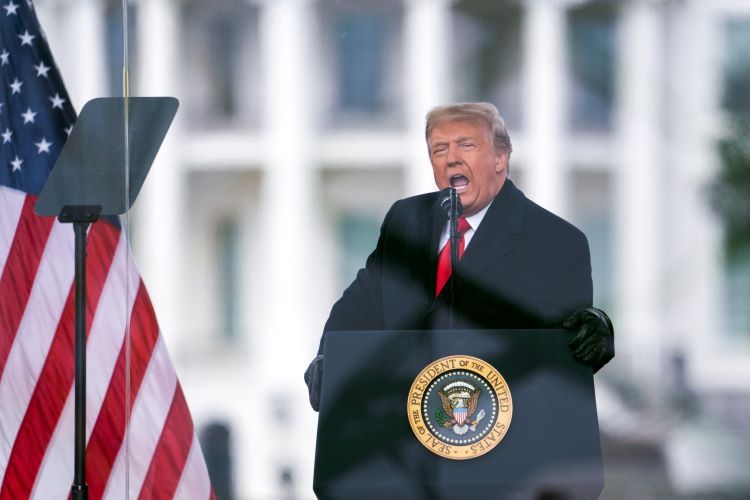Trump doesn't have official-act immunity in Capitol-riot suits if actions stemmed from candidacy, DC Circuit says

Donald Trump speaks at the Jan. 6, 2021 rally in Washington, D.C. (Photo by Evan Vucci/The Associated Press.)
Former President Donald Trump does not have official-act immunity, at least at this stage of the litigation, in lawsuits blaming him for the Capitol riot on Jan. 6, 2021, a federal appeals court ruled on Friday.
Ruling in three consolidated cases, the U.S. Court of Appeals for the D.C. Circuit said a campaign to gain office is not an official act that would entitle Trump to immunity.
The appeals court added, however, that it was ruling on a motion to dismiss, a point in the case in which the court is required to accept the truth of the plaintiffs’ factual allegations. Trump will have a chance to counter the allegations and will also have a chance to advance his argument that his acts were protected under the First Amendment.
The plaintiffs are Capitol police officers and members of Congress seeking damages for injuries and emotional distress. They contend Trump’s false claims about a stolen presidential election and his Jan. 6, 2021 speech sparked the riot. The lawsuits are based on Washington, D.C., law and Section 1985 of Title 42 of the U.S. Code, which bans conspiring to prevent anyone from holding a federal office or performing the duties of that office.
One of the plaintiffs was an officer who was injured when he was crushed against the doors of the Capitol, beaten by rioters and sprayed with chemicals. A second plaintiff is an officer in the Capitol Crypt who was beaten and subjected to racial epithets. Other plaintiffs were lawmakers who were trapped inside Capitol chambers as rioters advanced.
Trump had argued he was speaking on matters of public concern, which is an official function. He also claimed his actions were official because they concerned his constitutional duty under Article II, Section 3: the take care clause. “We are unpersuaded by either argument,” the appeals court said in the Dec. 1 panel opinion by Judge Sri Srinivasan, an appointee of former President Barack Obama.
Trump had argued that all speech on matters of public concern, as a categorical rule, is an official act. “That is a sweeping proposition, and one that ultimately sweeps too far,” the appeals court said.
“For purposes of presidential immunity,” the appeals court said, “the key is whether the president is speaking (or engaging in conduct) in an official capacity as office-holder or instead in an unofficial capacity as officer-seeker. Whether the speech relates to matters of public concern is beside the point.”
In a concurrence, Judge Gregory G. Katsas stressed the plaintiffs’ allegations that Trump’s Jan. 6 speech was organized by campaign staff and funded by private donors. “Given those allegations. which remain to be tested on summary judgment or at trial, we cannot resolve the immunity question,” said Katsas, a Trump appointee.
Katsas added that a president’s speech at a campaign event could in some cases be official. He gave the example of a president using a campaign event to announce the removal of his secretary of state.
“Despite the court’s emphasis on the formal ‘trappings’ of an event,” Katsas wrote, “its contextual approach does not foreclose consideration of the constitutional and practical imperative that the president must be able to engage in official business on a moment’s notice, even when speaking at campaign events.”
Hat tip to Law360, which covered the opinion.
Write a letter to the editor, share a story tip or update, or report an error.


